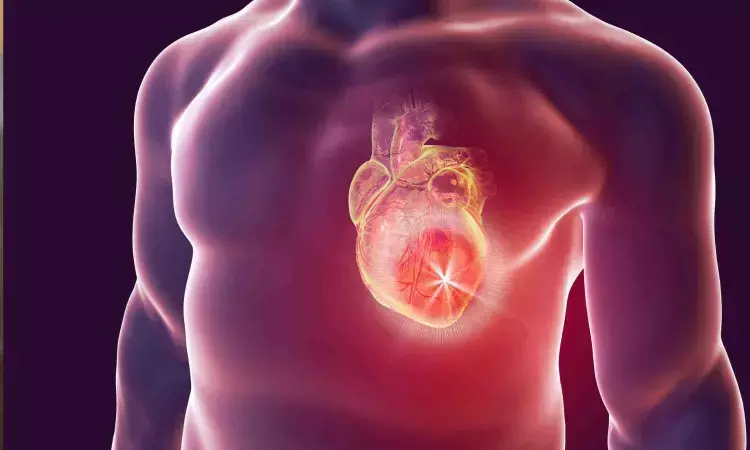- Home
- Medical news & Guidelines
- Anesthesiology
- Cardiology and CTVS
- Critical Care
- Dentistry
- Dermatology
- Diabetes and Endocrinology
- ENT
- Gastroenterology
- Medicine
- Nephrology
- Neurology
- Obstretics-Gynaecology
- Oncology
- Ophthalmology
- Orthopaedics
- Pediatrics-Neonatology
- Psychiatry
- Pulmonology
- Radiology
- Surgery
- Urology
- Laboratory Medicine
- Diet
- Nursing
- Paramedical
- Physiotherapy
- Health news
- Fact Check
- Bone Health Fact Check
- Brain Health Fact Check
- Cancer Related Fact Check
- Child Care Fact Check
- Dental and oral health fact check
- Diabetes and metabolic health fact check
- Diet and Nutrition Fact Check
- Eye and ENT Care Fact Check
- Fitness fact check
- Gut health fact check
- Heart health fact check
- Kidney health fact check
- Medical education fact check
- Men's health fact check
- Respiratory fact check
- Skin and hair care fact check
- Vaccine and Immunization fact check
- Women's health fact check
- AYUSH
- State News
- Andaman and Nicobar Islands
- Andhra Pradesh
- Arunachal Pradesh
- Assam
- Bihar
- Chandigarh
- Chattisgarh
- Dadra and Nagar Haveli
- Daman and Diu
- Delhi
- Goa
- Gujarat
- Haryana
- Himachal Pradesh
- Jammu & Kashmir
- Jharkhand
- Karnataka
- Kerala
- Ladakh
- Lakshadweep
- Madhya Pradesh
- Maharashtra
- Manipur
- Meghalaya
- Mizoram
- Nagaland
- Odisha
- Puducherry
- Punjab
- Rajasthan
- Sikkim
- Tamil Nadu
- Telangana
- Tripura
- Uttar Pradesh
- Uttrakhand
- West Bengal
- Medical Education
- Industry
Cardiovascular Damage in Systemic Lupus Erythematosus Develops Early and Persists Throughout Disease: BMJ

Spain: A recent study published in Lupus Science & Medicine concluded that new damage primarily develops within the first year after a systemic lupus erythematosus (SLE) diagnosis, with cardiovascular issues significant throughout the early and late stages of the disease. Early implementation of strategies to prevent cardiovascular damage is crucial following an SLE diagnosis.
Systemic lupus erythematosus is an autoimmune disease. In this disease, the immune system of the body mistakenly attacks healthy tissue. It affects the skin, joints, kidneys, brain, and other organs. SLE is more common in women than men by nearly 10 to 1. Irene Altabás-González from the rheumatology department, Vigo University Hospital Group, Vigo, Spain, et.al, conducted a study to assess organ damage, especially the cardiovascular system at the different stages of the disease.
For this purpose, the research team conducted a cohort study with 4219 patients enrolled in Spanish Society of Rheumatology Lupus Registry. Using Systemic Lupus International Collaborating Clinics/American College of Rheumatology Damage Index (SDI) the organ damage was noted. They analyzed 1274 patients over time whose dates of damage events had been recorded.
The findings revealed that:
• In the first year following an SLE diagnosis, 20% of the 1274 patients developed new damage manifestations.
• In the second and third years, new damage was observed in 11% and 9% of patients, respectively. After the fifth year, the annual percentage of patients with new damage declined to 5%.
• During the first year of the disease, most damage occurred in the musculoskeletal, neuropsychiatric, and renal systems. In later stages, the musculoskeletal, ocular, and cardiovascular systems were predominantly affected.
• When including ‘cerebrovascular accident’ and ‘claudication for 6 months’ as cardiovascular items, the cardiovascular system emerged as the second most affected system in the early stages of SLE, with 19% of patients who presented with damage being affected in the first year after diagnosis.
• In the later stages, 20-25% of patients presenting with new damage were affected in this modified cardiovascular domain of the SDI.
“The researchers concluded that cardiovascular damage occurs during the first year after the diagnosis of SLE. Strategies need to be adopted to prevent organ damage and cardiovascular diseases at early and late stages,”, researchers concluded.
Reference
Altabás-González, I., Rua-Figueroa, I., Mouriño, C., Roberts, K., Jimenez, N., Martinez-Barrio, J., Galindo, M., Calvo Alén, J., Pérez, V. D. C., Uriarte Itzazelaia, E., Tomero, E., Freire-González, M., Martínez Taboada, V., Salgado, E., Vela, P., Fernandez-Nebro, A., Olivé, A., Narváez, J., Menor-Almagro, R., Soler, G. S., … Pego-Reigosa, J. M. (2024). Damage in a large systemic lupus erythematosus cohort from the Spanish Society of Rheumatology Lupus Registry (RELESSER) with emphasis on the cardiovascular system: a longitudinal analysis. Lupus science & medicine, 11(2), e001064. https://doi.org/10.1136/lupus-2023-001064
Deepanshi Bhatnagar (MSc Nutrition and Dietetics) is a professional with a master's degree in Nutrition and Dietetics from MRIIRS. With a strong academic background, she is well-versed in the principles of nutrition and dietary science. At Medical Dialogues, Deepanshi serves as the correspondent for fact-checking, where she is responsible for verifying and evaluating claims related to nutrition and diet, ensuring that all content is accurate, evidence-based, and scientifically sound.
Dr Kamal Kant Kohli-MBBS, DTCD- a chest specialist with more than 30 years of practice and a flair for writing clinical articles, Dr Kamal Kant Kohli joined Medical Dialogues as a Chief Editor of Medical News. Besides writing articles, as an editor, he proofreads and verifies all the medical content published on Medical Dialogues including those coming from journals, studies,medical conferences,guidelines etc. Email: drkohli@medicaldialogues.in. Contact no. 011-43720751


